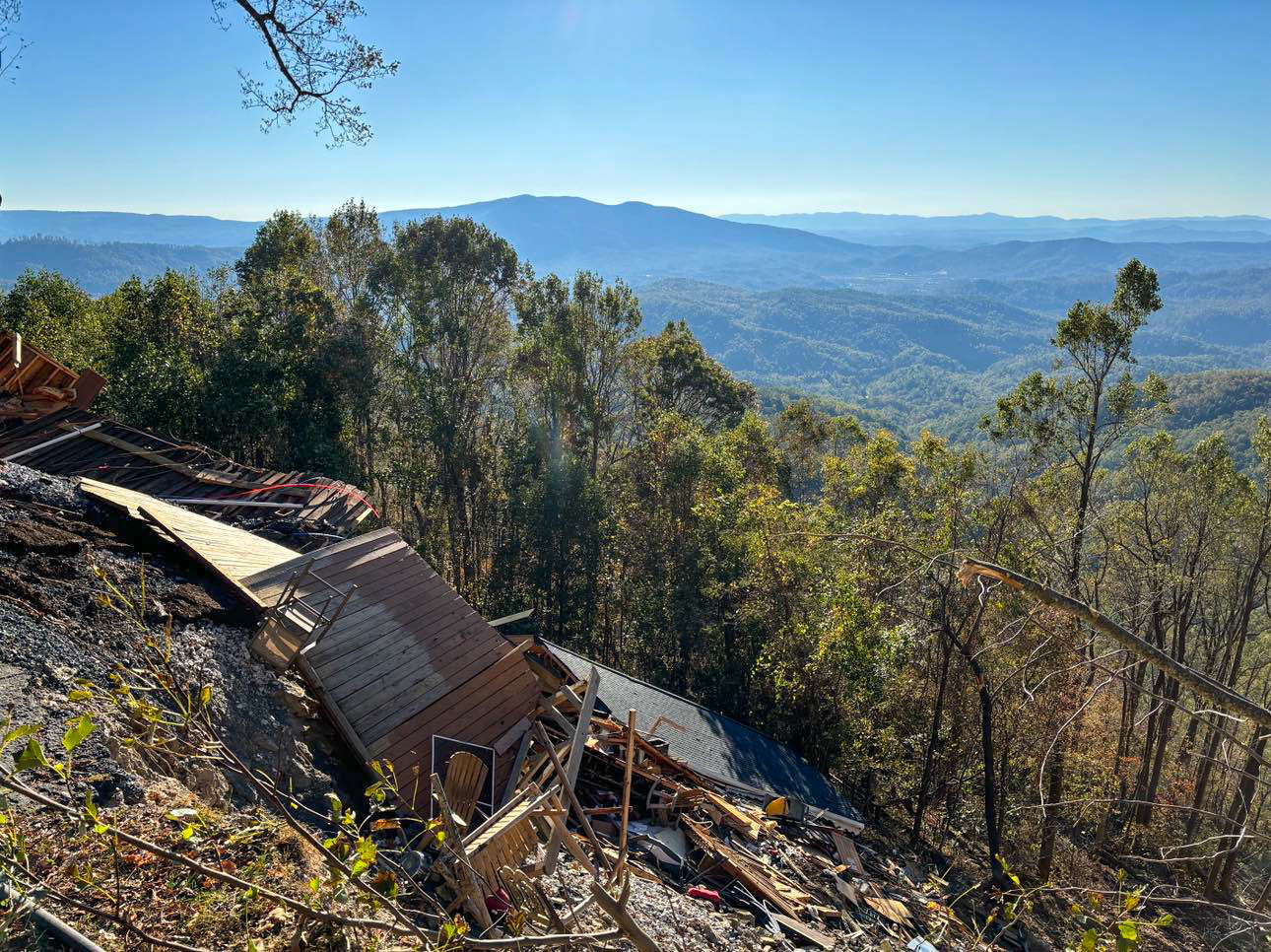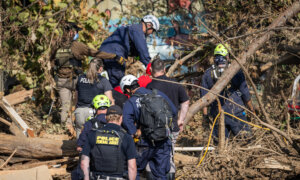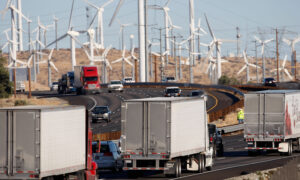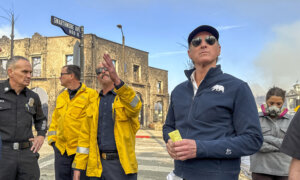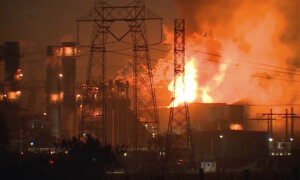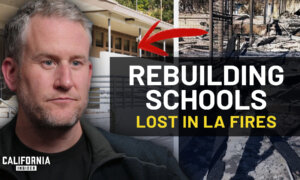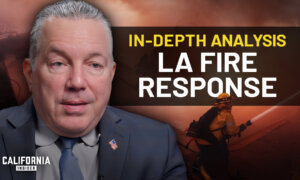SPRUCE PINE, N.C.—A few weeks ago, a group of men and women from all around the country were strangers embarking on their daily routines. And then Hurricane Helene struck.
The storm that made landfall in Florida continued its long path of destruction into western North Carolina. A stalled weather front over the mountains had brought more than a foot of rain in the days before, swelling creeks, streams, and rivers. Hurricane Helene then arrived when there was nowhere left for the excessive water to go but through people’s homes.
The raging water pushed homes off their foundations and carried them down mountains, floated cars and semi-trucks into treetops, and twisted train tracks. Swaths of debris collected around bridges, and some of those bridges snapped. Many villages and hamlets high in the mountains were mostly or fully destroyed.
At a once vacant field in front of Buck Stove, a base camp emerged where citizen disaster relief volunteers could station their RVs and other vehicles while dispersing across the region to help storm victims.
Billy Barthel and his “significant other,” Andrea Mathews, are the organizers of what they call Camp Unknown. Social media posts have been spreading about their efforts, as good Samaritans left their lives back home to set up their RVs and tents and complete daily tasks in the disaster zone that range from welfare checks of residents in isolated mountain towns and the delivery of supplies to cleaning up houses and clearing driveways and roads with chainsaws.
On Oct. 17, Barthel invited The Epoch Times to visit the camp and join him on a morning and afternoon of assignments.
After breakfast—fresh sausage and scrambled eggs prepared by a volunteer from Louisiana who serves as the camp cook—he scanned the RVs and other vehicles parked around the property.
“Look at all these license plates: Maryland. Montana. Wyoming. Ohio. Texas. Since we started here, people have arrived from dozens of states, staying here as long as they can,” Barthel said.
“It’s inspiring to see. It’s inspiring to be a part of all this. Disasters bring out the best and the worst in people. This is part of the best.”
Rick Blair is also known as “Blonde Jesus” because of his long, blond hair and beard. He told The Epoch Times that he felt compelled to drive from Raleigh, more than 200 miles east of Spruce Pine and mostly untouched by Helene, to western North Carolina.
“I just got in my car and found my way here. I heard about what they are doing and just knew that a lot of people needed help,” Blair said.
“None of us knew each other before all of this and now, we’re all working together for the common purpose of going wherever we are needed and doing whatever is needed. Everyone is trying to take care of everyone. It’s a beautiful sight.”
Ian Nicholson and his wife live a few miles away from the camp. They evacuated, and when they returned, the century-old towering oak trees that graced their property before the storm were scattered along their driveway.
“Six guys from here showed up and completed what would have taken us alone a month at least in just two days. They helped me, and I don’t take anything for free, so I felt drawn to help,” he told The Epoch Times.
Each day at the camp begins with a morning briefing just around sunrise.
“We’re gonna give work orders out to people. It’s gonna have a name, address, and a phone number. Give those people a call when you’re on your way out there,” Mathews told a group of a few dozen volunteers on Oct. 17.

Billy Barthel and Andrea Mathews manage Camp Unknown, which provides volunteer disaster relief in Spruce Pine, N.C. Photo taken on Oct. 17, 2024. (Jeff Louderback/The Epoch Times)
Work orders include the type of task needed and the necessary tools.
“If you get there and need something else, let us know so we can send someone else out to bring it,” Nicholson told the group.
“If they need any supplies, take a note of that so we can have somebody run supplies to them—blankets, heaters, whatever they might need. If they have a neighbor who says they need help too, take their name, number, and address, and we'll get them on the list and make sure they get what they need.”
After leaving the camp on Oct. 17, Barthel drove up through the devastated areas of Little Switzerland, where workers and guests at the Alpine Hill escaped a building minutes before it collapsed down the mountainside, and Hoyt Johnson and his wife, Kelly, transformed their rustic Big Lynn Lodge into a haven of relief supplies, free hot meals for locals, and rooms for displaced locals and out-of-state utility workers.
Barthel and Mathews live “a mile or so away” from the Big Lynn Lodge, and the couple volunteered there before managing Camp Unknown.
Hope for Survivors
Search and rescue teams from all over the country descended upon western North Carolina after Helene passed and were guided by locals eager to assist their efforts. Some people couldn’t be reached for days and weeks. With roads washed away, teams traversed the mountain on mules, horseback, and foot.North Carolina’s Division of Public Health reported on Oct. 20 that the majority of the 95 deaths in the state resulting from Helene have been attributed to drownings and landslides.

Billy Barthel inspects a property marked for cleanup in the mountains of Little Switzerland, N.C., on Oct. 17, 2024. (Jeff Louderback/The Epoch Times)
Barthel told The Epoch Times that he believes that the death toll is “significantly higher” than what is being reported.
“Our teams are finding bodies at homes,“ he said. ”We call the authorities, tell them the location, and keep searching at other locations. It’s not pleasant, but it’s necessary. Many people are in isolated areas. Every person at every home deserves a welfare check, no matter how hard it is to reach them.”
In his truck, Barthel excused himself for a moment and took a call from a man who asked about the needs and plans for the day.
“If there is anything I can do to help y’all out down there, just give us a holler. We’ll kick down more aid,” the man said.
When asked about the man’s identity, Barthel smiled and responded: “I have no idea. People are calling from every part of the country. It’s gratifying. We are dealing with fatigue and little sleep. But we know this is important and people are counting on us, so we gotta keep going.”
Barthel’s drive through Little Switzerland leads past winding roads, some limited to one lane because of damage from the mudslides, and patches of mountains that were once covered with lush forests but are now open areas littered with boulders, splintered trees, and storm debris.
“We’re on our way to drop off clothes and supplies to a guy named Sam,“ he said. ”He lives in a 19th-century cabin in an isolated area. He’s a humble man who doesn’t ask for anything, and we’re gonna help him out.”

A man who lives in a 19th-century cabin in the western North Carolina mountains receives assistance from a volunteer group at Camp Unknown on Oct. 17, 2024. (Jeff Louderback/The Epoch Times)
When Barthel arrived at the property, Sam was not home. Barthel placed a few bags of clothes and supplies on the porch and walked around the area that weeks before was immaculately landscaped with a water wheel, flowering bushes and plants, and a pond.
“It was absolutely beautiful, and now it’s a barren wasteland,” Barthel said, scanning the area.
Outside Sam’s cabin is a sign that reads “How Great Thou Art.” Another sign indicates the year the cabin was built—1840. On the other side of the creek, a crumpled shed and cabin serve as reminders of how some properties survived and others were claimed by the disaster.
“This was a storm of biblical proportions,” Barthel said. “We had a hurricane, some tornadoes, mudslides, and historic flooding.
“It’s eye-opening driving on these mountain roads and seeing the mudslide paths and how some houses survived and others so close by were destroyed.”
Barthel surveyed Sam’s land—which was covered in two feet of mud, sand, and rocks—and vowed to return and clean it up as best as Camp Unknown could.
No Electricity, Heat, Water
Not far from Sam’s cabin, Larry Budd and his wife are temporarily living in a camper across the mountain road from their house that was spared by a tornado and mudslide.“We have no electric, no heat, and no water, but we’re alive, and our house is mostly intact, so we are fortunate,” Budd said.
“We were playing Monopoly at the kitchen table and heard what sounded like a tornado. Then, we saw trees coming down the creek.”

Gary Budd, seen on Oct. 17, 2024, survived Hurricane Helene with his wife, but his property received extensive damage. (Jeff Louderback/The Epoch Times)
Budd said he believes that the only reason his home was not washed away by the mudslide is the towering boulders that shield it from the creek.
A short walk from his camper is a narrow gravel road that leads to another home on top of the mountain. That pathway is now unrecognizable, covered by mud, sand, and rocks with a redirected creek that cuts down the mountain.
“How are they ever gonna get all of that cleaned up?” Budd said.
Closer to Spruce Pine, an elderly woman on a breathing machine is in desperate need of a small generator. As Barthel reaches a gravel road that leads up a steep hill, he is met with utility company workers. The road ahead is blocked by trucks, and power would be restored later that day, he’s told.
“That’s a good thing. She will be able to use her breathing machine again, and we will take the generator to someone else on the list,” he said.
Land of Generations
Before returning to the base camp, Barthel wanted to check on a few of his team members who were cleaning up a property.Bethany Glenn; her husband, Blake; and their son, Asher, live in a house across from a creek near Spruce Pine. Their farm sits on nearby land owned by her mother that has been in the family for several generations.
Crews from Barthel’s camp arrived there with chainsaws and Bobcats to start a cleanup process that could take weeks, Glenn said.
Once a green pasture dotted with cows, goats, turkeys, chickens, and rabbits, the property is now covered in more than a foot of mud, sand, rocks, and downed trees. The animals are gone, and a sprawling garden is ruined.
“I’ve lived here my whole life,“ Glenn said. ”When I look at this, know what it was, and see what it is now, I wonder if it will ever be the same and wonder if we will ever get this cleaned up. These people are God’s blessing. I don’t know what we would do without everyday citizens coming in from all over the country to help people they don’t even know.”
Glenn’s mother is battling cancer and uses a breathing machine. When Helene hit, the water kept rising and Blake Glenn walked to his mother-in-law’s home across the creek that was no longer reachable by bridge.
“I was here with Asher and wondered should we stay or leave,“ she said. ”I would have gone to higher ground at a neighbor’s house, but fortunately the water started to recede.”

A volunteer crew starts the cleanup process at the Glenn family farm near Spruce Pine, N.C., on Oct. 17, 2024. (Jeff Louderback/The Epoch Times)
The Glenns are determined to clean up for as long as it takes and rebuild the farm.
“We talked about not rebuilding, but then we decided we would roll the dice because this is a one-of-a-kind disaster,“ Glenn said. ”We will build the barn on higher ground. This is great growing ground. This is home. We will roll the dice and do it again.”
Upon returning to Camp Unknown, Barthel sat down with Mathews in their camper with their four dogs. Barthel said he returns to their house high in the mountains in Little Switzerland every two days to run the generator for a few hours to keep the food in the freezer from spoiling.
“For the time being, this is home, and we might as well be there doing all we can to help people instead of sitting in the dark at our house,” Mathews said with a grin.
Unity Through Challenges
Social media has fueled volunteer efforts and supplies, but a Facebook post led to an unexpected crisis at the camp on Oct. 20.An out-of-state group set up their RV at Camp Unknown and wrote two Facebook posts that free generators and chainsaws were available for whoever needs them. The group members published the camp’s address, and within hours, a few hundred people descended upon the camp, taking the chainsaws and generators provided by the group and removing equipment and supplies in other areas of the camp.
“They had good intentions, but we closely vet who we give out the chainsaws, generators, and other items to so we make sure people who need them get them. The Facebook post led to a large influx of people in the camp we weren’t expecting, which caused a security problem. We had to shut things down for the day and regroup,” Barthel said.
Camp Unknown’s mission continues, only now with a secured checkpoint and volunteers who provide security.
Sandra Francis is part of a group from Highland County in southern Ohio that learned about Camp Unknown from Facebook. She told The Epoch Times that she is glad that the camp’s purpose continues.
Members of Francis’s group rallied to gather supplies and provide transportation to assist Camp Unknown. Francis and others drove down to drop off the items to Barthel. The load included generators; livestock, dog, and cat food; water tanks; food-grade barrels; medical supplies; and camping and survival gear.
“You can feel the unity there. People who never imagined they would meet at a place they never thought they would sleep are all at the camp because so many families are hurting and don’t know what they’re going to do next,” Francis told The Epoch Times.
“How could you look at the photos and stories on social media TV and not feel motivated to do something to help? I think that people from around the country would do the same thing if something of this magnitude happened in southern Ohio.”
Barthel echoed what Francis said. Camaraderie is strong among the teams of volunteers, even amid the challenges.
“We don’t know how long we’ll be here, but we’re expecting more people from around the country to come in, and it will take months before many of the homes and properties will get cleaned up, and people start having everything they need,” Barthel said.
“We never expected this—the devastation from Helene, and the camp becoming a gathering point—but the disaster happened, and so many people have responded by putting their lives on hold to help out.
“At a time when we hear so much about all the bad in the world, it’s encouraging to see that there is still a lot of good, even when we’re surrounded by so much destruction.”
